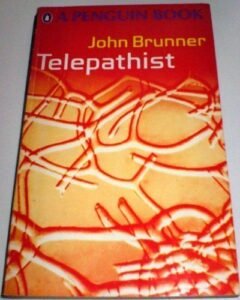Telepathist by John Brunner (book review).
One unique aspect of science fiction, compared to other genres, is that its settings can become timeless, particularly when they are not associated with a specific date. The city in John Brunner’s ‘Telepathist’ has a terrorist problem and a police/military presence that checks everyone out. Sarah Howson has given birth to a crippled baby. Her lover, Gerald Pond, was a terrorist and recently killed. She calls the baby Gerald. Did I say she wasn’t too bright? But she doesn’t really care much for her son. Grown up, Gerry, in turn, discovers he’s a telepathist, and giving information to one of the local gangs is given more money than the little jobs he can find. I should point out that Gerry isn’t just a telepath but shows some telekinetic abilities as well. He has also acquired a girlfriend of sorts who is dependent because she is both deaf and dumb.
The second part of this story is a direct contrast to the first, where Gerry Howson is in hospital and getting top treatment and, to add to his woes, is told he’s a haemophiliac and must avoid physical injury. Oddly, his unnamed girlfriend is given what we would now call bionic implants and practically sidelined, as she doesn’t hang around. Brunner wrote this novel as three short stories in 1958-59, but this section looks like it was being used as a build-up to what would follow, and we glimpse some other patients who have been damaged by using their abilities.
The third part is eleven years later, and Gerry, now a famous telepathist with a doctorate, finds a couple of the patients were reacting to a mental fugue, a sort of dream state where a telepathist draws in other telepathists around him. It takes a stronger telepathist to free them, and Gerry qualifies as this. Much of it is him returning to his old city on holiday and seeing how much things have changed. His supposed girlfriend is now married with children, but he’s aware she’s not keen to have him around. Instead, Gerry ends up at a party of students who are aware of his doctorhood but not of what. The rest is a spoiler.
One of the strengths of Brunner’s writing is how he conjures up imagery in your head before focusing on events. He can also be a challenging read but very rewarding. Please remember, these three stories were written in 1958-59, and the term ‘telepath’ hadn’t been accepted as a term yet. Instead of focussing on wars, Brunner also viewed telepathy as a means to provide therapy for mentally disturbed individuals and explored how these telepathists achieve celebrity status. Quite how Gerry isn’t recognised by the student considering his crippled status isn’t explained, but I doubt if Brunner would have considered our future where social information would have been possible. It’s still a strong, united story even if the ending was somewhat contrived to be happy.
GF Willmetts
October 2025
(pub: Penguin, 1968 from material going back to 1959. 190 page paperback. Price; varies. ISBN: 715).


